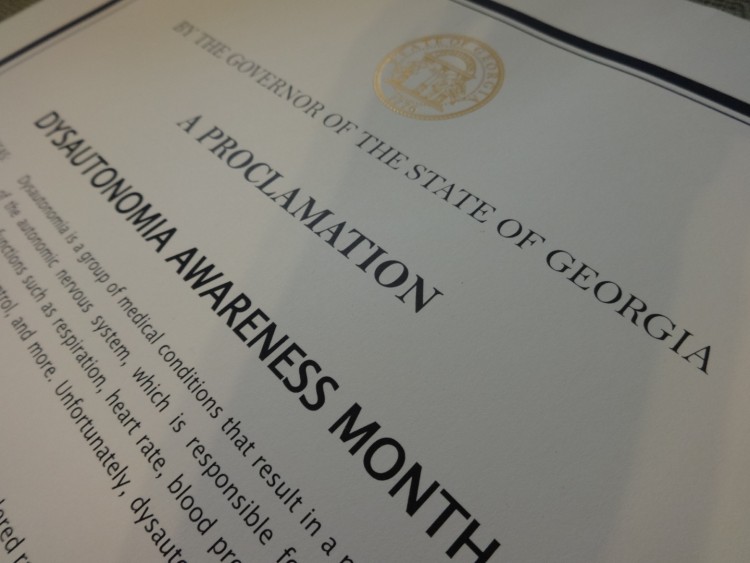5 Reasons It's Critical We Raise Awareness for Dysautonomia
October is Dysautonomia Awareness Month, and I can’t help but to think of reasons why dysautonomia (along with the abundance of medical conditions under the autonomic dysfunction spectrum) needs so much awareness in our communities. 
It’s ridiculous how the amount of uneducated medical professionals outweighs the tens of millions of patients living with this life-altering illness who are spending an average of six years fighting to get a proper diagnosis so they can hopefully find relief from these horrid symptoms. Consequently, even with a dysautonomia diagnosis, most physicians, especially emergency room specialists and “adult doctors,” are so ill-informed of this term that they lack the knowledge of effective treatments. Below are a list of reasons (in no particular order) why we are in desperate need of awareness. My wish is that one day everyone will be able to speak about dysautonomia with familiarity and understanding.
1. Research Funds
We need awareness in order to gain research funds for better treatment options and maybe even a cure in the future. Did you know postural orthostatic tachycardia syndrome (POTS), a common form of dysautonomia) is more common than multiple sclerosis and Parkinson’s disease? Yet POTS research earns fewer funds.
2. Physician Knowledge
Dysautonomia is not always taught in medical school. Pediatricians may recognize dysfunctions of the autonomic nervous system, because many seem to believe it is a childhood illness patients are able to grow out of before they reach adulthood. Now, it’s obvious that’s not always the case. Many patients do not grow out of it — hence why it is a chronic, invisible illness. We need awareness in order to reduce the average diagnosis time of six years, because so many patients get misdiagnosed or even remain undiagnosed before they are finally diagnosed with dysautonomia. Oftentimes patients have to bounce around from specialist to specialist, traveling hundreds of miles just to find a doctor who recognizes the signs of dysautonomia.
3. Understanding From Family and Friends
We need awareness because our friends and family do not always understand how debilitating this illness is. Dysautonomia affects the entire autonomic nervous system, so every involuntary bodily function can malfunction at any given time. Blood pressure, respiration, heart rate, digestion, cognition, temperature regulation, you name it. We’re not lazy; we’re far from it. We’re battling an internal battle 24/7, 365 days a year. Some of us are fortunate enough to have a supportive team of family and friends. Others are not so lucky. Because it’s so unknown, many people do not believe it to be a real condition. So, when we cancel plans because we are not feeling well enough to go out, our friends and family often give us the cold shoulder and say we’re making excuses. No, we’re ill and shouldn’t have to prove how sick we really are in order to fit their standards of what being “sick” is supposed to look like. With more awareness, perhaps they will finally believe that we are not making excuses or faking it.
4. Reduce the Number of Lives Lost
We need awareness so no more lives have to be lost due to a misdiagnosis or a lack of understanding. On one end of the spectrum, we have patients with fatal forms of dysautonomia not getting diagnosed soon enough, and therefore not getting the lifesaving treatments they need in a timely manner. On the other end of the spectrum, we have patients ending their lives because of the lack of understanding and/or because they feel alone. Having a chronic illness takes a massive toll on your mental and emotional health and frequently causes feelings of self-doubt, guilt and worthlessness. The effects are only multiplied when you have a little-known illness with a not-so-great support team.
5. End the Stigma Surrounding Invisible Illnesses
We need awareness so we can stop hearing the following statements:
“You’re too young to be sick.”
“If only you’d get out more.”
“Try harder and push through it.”
“You don’t look sick.”
“Just think positive.”
“Just pray more.”
“Some people have it worse.”
“Oh, I get tired too.”
“You can’t park there, you can walk.”
“It’s just anxiety.”
“Stop looking up your illnesses.”
“I wish I could stay in bed all day.”
“You were just fine yesterday.”
“You need to exercise more.”
“I don’t believe you.”
These statements are only a small handful of what patients hear and see everyday. We’re used to these words, but it doesn’t make them hurt any less. I promise, your silence is more appreciated than your unsolicited medical advice.
In conclusion…
Awareness starts with educating others about dysautonomia.
Awareness starts with sharing facts about dysautonomia via social media.
Awareness starts with physicians researching dysautonomia in order to treat their patients.
Awareness starts with supporting our loved ones affected by this illness.
Awareness starts with fundraising in our communities.
Awareness starts with participating in Dysautonomia Awareness Month activities.
Awareness starts with me.
Awareness starts with you.
Every single person who is able to recognize symptoms of autonomic dysfunction brings us one step closer to a cure. Join the fight. Spread awareness.
We want to hear your story. Become a Mighty contributor here.

